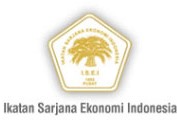EFFECT OF TRADE OPENNESS ON THE ENVIRONMENTAL PERFORMANCE INDEX IN SUB-SAHARA AFRICA
(1) Universitas Negeri Semarang
(2) Universitas Negeri Semarang
Abstract
A possible solution to overcome the dilemma between trade openness and the environment can be done by adjusting the factors that might affect the environmental performance index. However, this can only be done if there is an established relationship between the influencing factors. The purpose of this study was to analyze the effect of trade openness, energy, technology, and population on the environmental performance index in Sub-Saharan Africa. This type of research is a quantitative research using panel data regression analysis tool. Trade openness, energy, and population have a positive and significant influence on the environmental performance index in Sub-Saharan Africa.
Full Text:
PDFReferences
Alotaibi, A., & Mishra, A. (2014). Determinants Of International Financial Integration Of G
CC Markets. (2013). In Emerging Markets and the Global Economy: A Handbook (Issue 2007). Elsevier Inc. https://doi.org/10.1016/B978-0-12-411549-1.00031-4.
Antweiler, W., Copeland, B., & Taylor, M. (2001). Is Free Trade Good For The Environment? American Economic Review, 91(4), 877–908.https://doi.org/10.1257/aer.91.4.877.
Apergis, N. (2016). Environmental Kuznets Curves: New Evidence On Both Panels And Country-Level CO2 Emissions. Energy Economics, 54, 263–271. https://doi.org/10.1016/j.eneco.2015.12.007.
Asongu, S., & Le Roux, S. (2017). Enhancing ICT For Inclusive Human Development In Sub-Saharan Africa. Technological Forecasting And Social Change, 118(April), 44-54. https://doi.org/10.1016/j.techfore.2017.01.026.
Asongu, SA, Le Roux, S., & Biekpe, N. (2017). Environmental Degradation, ICT And Inclusive Development In Sub-Saharan Africa. Energy Policy, 111(July), 353–361. https://doi.org/10.1016/j.enpol.2017.09.049.
Avom, D., Nkengfack, H., Fotio, H., & Totouom, A. (2020). ICT And Environmental Quality In Sub-Saharan Africa: Effects And Transmission Channels. Technological Forecasting And Social Change, 155(August 2019), 120028.https://doi.org/10.1016/j.techfore.2020.120028.
Bhattacharya, M., Awaworyi C., & Paramati, S. (2017). The Dynamic Impact Of Renewable Energy And Institutions On Economic Output And CO2 Emissions Across Regions. Renewable Energy, 111, 157–167. https://doi.org/10.1016/j.renene.2017.03.102.
Boleti, E., Garas, A., Kyriakou, A., & Lapatinas, A. (2021). Economic Complexity And Environmental Performance: Evidence From A World Sample. Environmental Modeling And Assessment, 26(3), 251–270. https://doi.org/10.1007/s10666-021-09750-0.
Chen, J., Wang, P., Cui, L., Huang, S., & Song, M. (2018). Decomposition And Decoupling Analysis Of CO2 Emissions In The OECD. Applied Energy, 231(July), 937–950. https://doi.org/10.1016/j.apenergy.2018.09.179.
Chrysovalantis, G., & Molnár, P. (2021). Economic Policies And Their Effects On Financial Markets. European Journal Of Finance, 27(10), 929–931.https://doi.org/10.1080/1351847X.2021.1899955.
Mahmood, H., Maalel, N., & Zarrad, O. (2019). Trade Openness And CO2 Emissions: Evidence From Tunisia. Sustainability, 11.
Sun, H., Enna, L., Monney, A., Khoa, D., Rasoulinezhad, E., Taghizadeh-Hesary, F. (2020). The Long-Run Effects Of Trade Openness On Carbon Emissions In Sub-Saharan African Countries. Energies, 13.
Le, T., Chang, Y., & Park, D. (2016). Trade Openness And Environmental Quality: International Evidence. Energy Policy, 92, 45–55. https://doi.org/10.1016/j.enpol.2016.01.030.
Mahmood, H., Furqan, M., Alkhateeb, T., & Fawaz, M. (2019). Testing The Environmental Kuznets Curve In Egypt: Role Of Foreign Investment And Trade. International Journal Of Energy Economics And Policy, 9(2), 225–228.https://doi.org/10.32479/ijeep.7271.
Managi, S. (2012). Institute Of Developing Economies Trade , Economic Growth And Environment. Shunsuke Managi, 342.
Managi, S., & Kaneko, S. (2015). Environmental Kuznets Curve. Chinese Economic Development And The Environment, 1–17. https://doi.org/10.4337/978184980343400008.
Subair. (2015). The Relevance Of Malthus' Theory In Discourse. Journal Of Dialectics, 9(2), 96–110.
Sun, H., Enna, L., Monney, A., Tran, D., Rasoulinezhad, E., & Taghizadeh-Hesary, F. (2020). The Long-Run Effects Of Trade Openness On Carbon Emissions In Sub-Saharan African Countries. Energies, 13(20), 1–18. https://doi.org/10.3390/en13205295.
Vural, G. (2020). How Do Output, Trade, Renewable Energy And Non-Renewable Energy Impact Carbon Emissions In Selected Sub-Saharan African Countries? Resources Policy, 69, 101840. https://doi.org/10.1016/j.resourpol.2020.101840.
Wang, Q., & Zhang, F. (2021). The Effects Of Trade Openness On Decoupling Carbon Emissions From Economic Growth – Evidence From 182 Countries. Journal Of Cleaner Production, 279, 123838. https://doi.org/10.1016/j.jclepro.2020.123838.
Wargadinata, E. (2021). The Complexity Of Population And Environmental Relations. Journal Of Government Science Widya Praja, 47(1), 1–23. https://doi.org/10.33701/jipwp.v47i1.1456.
Yustisia, D., & Sugiyanto, C. (2014). Empirical Analysis Of The Environmental Kuznets Curve (Ekc). Journal Of Economics And Development Studies, 15, 161–170.
Zandi, G., & Haseeb, M. (2019). The Importance Of Green Energy Consumption And Agriculture In Reducing Environmental Degradation: Evidence From Sub-Saharan African Countries. International Journal Of Financial Research, 10(5), 215–227.https://doi.org/10.5430/ijfr.v10n5p215.
Refbacks
- There are currently no refbacks.

This work is licensed under a Creative Commons Attribution 4.0 International License.






